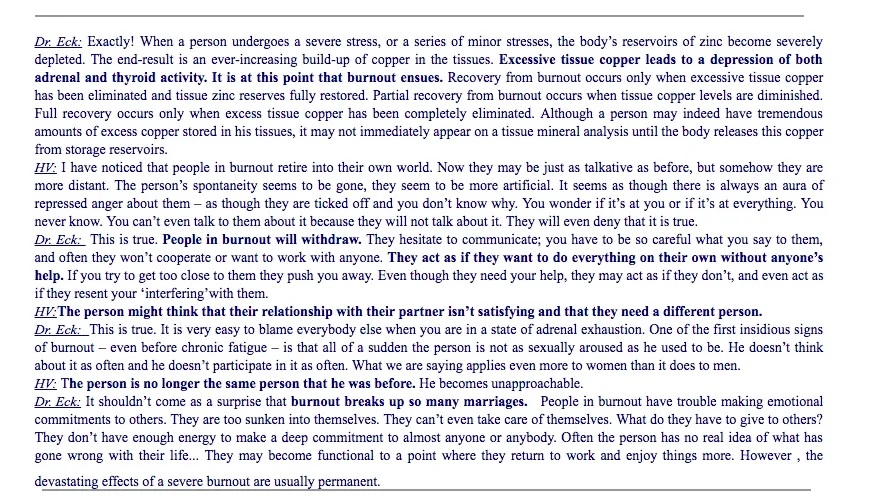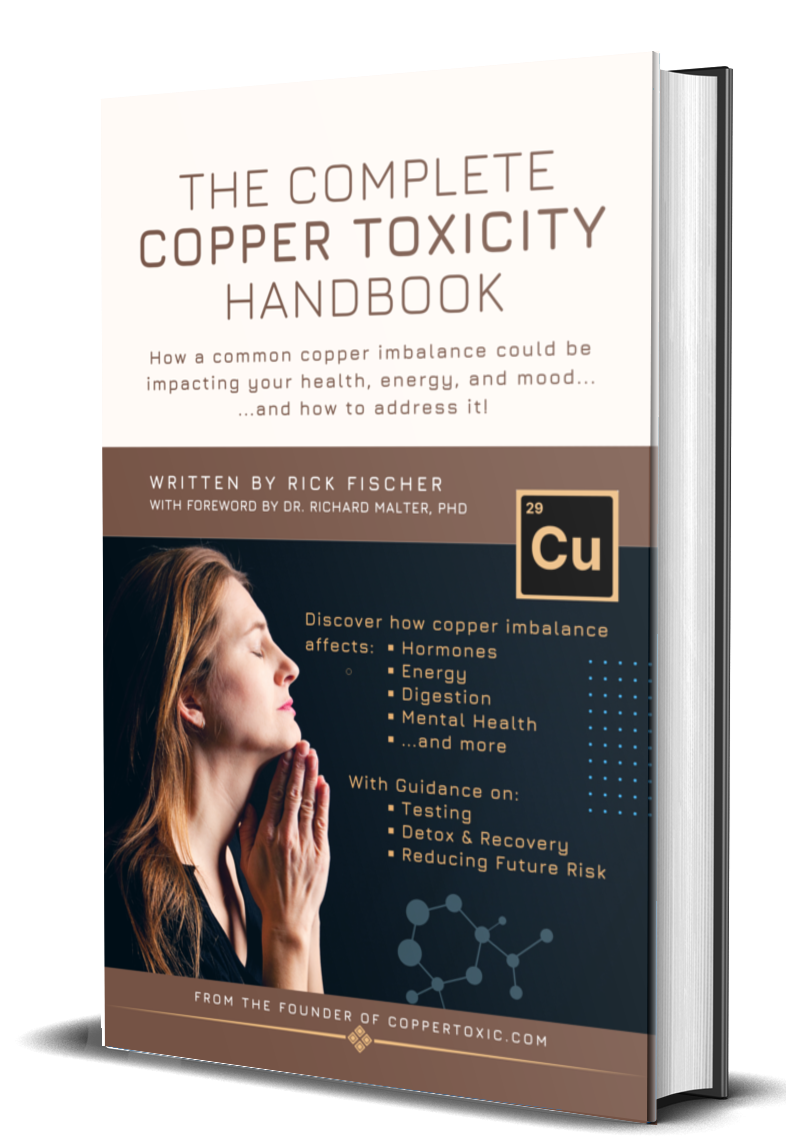Adrenals & Energy
Due to copper's initial "feel good" stimulatory and excitotoxicity effect, chronic over-exposure can lead into adrenal hypofunction and increasing states of fatigue. While a quick boost of adrenal support might be desired by the patient, too quick a boost can cause excessive copper mobilization, leading to increased psychological reactions.
Copper's Effect on the Adrenals and Energy
Though copper supports energy production, this too is only one side of the coin. Of course, copper is needed for energy production, especially considering that it’s essential in the final stage of the Krebs cycle (a process by which the mitochondria in our cells produce energy). However, copper is also a stimulant. In fact, Pfeiffer and Goldstein (1984) demonstrated that 5mg of copper has a similar stimulatory effect as the stimulant drug d-amphetamine!
This can be great for the marketing of copper supplements, as often people will comment on how great they feel when supplementing. However, similar could be said when drinking coffee – yes the caffeine provides energy and people feel great drinking it, but what is the long-term cost?
As copper accumulates and as is frequently seen with copper toxicity, there’s often an initial boost in energy and productivity. People feel energized, a sense in some cases of being able to take on the world. The mind is active and creativity flourishes. However, this chronic overstimulation has a downside over time as it can eventually lead to adrenal exhaustion or in some cases, burnout.
The accumulation of excess copper presents a continual source of internal stress which takes a toll on the adrenals. Under stress (from any source), the body loses both zinc and magnesium (calming minerals), while boosting sodium and aldosterone. This can lead to more “short fuse” type reactions to stressors. In turn, with zinc spiraling lower, copper accumulates further. Eventually, the body is no longer able to effectively respond to stress. If the body is unable to efficiently eliminate the copper, and so long as the exposure to copper continues, it can eventually lead to exhaustion / adrenal burnout, along with a crash in sodium and aldosterone. At this point, the person has little energy left to do anything. The more exhausted / underactive the adrenals become, the less the liver is generally then able to produce ceruloplasmin needed to make copper bioavailable, and so biounavailable copper then accumulates faster and faster in the liver (primary) and brain (secondary).
Full adrenal burnout is a game changer that in some cases can have lifelong effects on the patient. The obvious symptom is an overwhelming sense of debilitating fatigue, often with a period of complete and utter exhaustion. Resentment, withdrawal, dizziness, loss of libido, slurred speech, depression, insomnia, frustration, lost interest in relationships, moodiness, poor concentration, and irritability are all common symptoms.
Beyond the obvious symptoms just listed, the point of adrenal burnout can worsen the copper toxicity condition due in part to ceruloplasmin production decline. Ceruloplasmin is a glycoprotein produced in the liver, and it’s responsible for the transport of about 95% of the copper in the blood plasma. Upon burnout, the body may no longer be able to produce adequate ceruloplasmin**. With insufficient ceruloplasmin to bind to copper, copper is essentially bio-unavailable in the body, regardless of how much excess copper is being stored. In other words, a simultaneous deficiency condition is also created.
Without adequate Cp, copper is incapable of completing electron transport in the mitochondria (essential for our energy production). With copper not being used or properly eliminated, it further stores up in the tissues. Under stress or sudden increases in adrenal activity, copper can then leak out (or 'dump') from storage, and this can heighten many symptoms such as PMS type symptoms, insomnia, headaches, joint pains, skin rashes, anxiety, panic attacks, paranoia, and depression, among other problems.
**Note: Even though we may expect Cp to drop with burnout, as Cp is also an acute phase reactant, a long list of factors (including inflammation, infection, pregnancy, contraceptive pill usage, even carcinoma or lymphoma) can cause Cp to elevate. Furthermore, a "good" Cp level on a lab test still doesn't guarantee copper bioavailability due to Cp testing not differentiating between holo-ceruloplasmin and apo-ceruloplasmin. Thus, Cp may not always appear low even though we may expect it to be, nor is a “good” or high level always a sign of good health.
"Copper toxicity reduces the ability to cope normally with stress and the inability to respond adequately can provoke many fearful emotions, including anxiety and panic."
~ Theresa Vernon, L.Ac.
"Burnout causes emotional and physical devastation that cripples the person's personality and human potential ... The person whose life has been gutted by stress-damage usually does not know what hit him – and usually has no idea what is really wrong with him... When you go into burnout, unless you pull out of it and realize what actually happened to you - you can go into a state of disillusionment that can last the rest of your life." ~Dr. Eck
"The unfortunate consequence of all this fatigue-induced irritability can often be negatively felt in our relationships with those closest to us... Many women have missed out on important milestones in their loved ones’ lives due to debilitating fatigue that has left them unable to participate in even the most basic daily tasks...We feel too tired to keep up with the demands of life, so we feel overwhelmed. Feelings of overwhelm often result in losing sight of the bigger picture and difficulty seeing workable solutions to the problem at hand. Overwhelm spirals into feelings of guilt, frustration, disappointment, and, eventually, anger, resentment, and depression." ~ Michelle L. Brown, CTNC
Remember, anything that impairs or damages the mitochondria can impact one’s energy, since the mitochondria are ultimately responsible for our cellular energy production. Excess, unbound copper can have a negative effect on the mitochondria, leading to energy impairment.
“Mitochondria are more susceptible to damage from excess copper compared with other cellular compartments due to the presence of high-affinity copper-binding partners (e.g., Cu/Zn SOD, copper chaperones, copper ligand, and glutathione). Furthermore, copper inhibits key mitochondrial enzymes, disrupting the production of metabolites that are involved in epigenetic regulation.” [1]
The lack of energy resulting from adrenal exhaustion / burnout can have a profound effect on relationships as well. When exhaustion, depression, and anxiety take over, it's impossible to be the spouse one wants to be for their partner. Often, the patient is not even aware of what their feelings really are. The lack of energy reduces awareness to the true extent of the problem. Even libido drops since burnout mandates that the individual focuses more on survival rather than procreation. At this stage, many of the symptoms associated with copper toxicity are the same as those common with adrenal burnout, and the issue is just as much about the burnout as it is with the copper. The following conversation is taken from an interview with biochemist, HTMA and Nutritional Balancing pioneer and world's foremost expert on trace mineral relationships, the late Dr. Paul Eck, as can be found in the 1985 book 'Energy: How it Affects Your Emotions, Your Level of Achievement, and Your Entire Well-Being' by Chatsworth & Eck:

Excess copper accumulation also tends to increase the calcium to potassium ratio as seen through HTMA testing. This ratio is known as the thyroid ratio. A high Ca/K ratio is reflective of thyroid hypo-expression. Even if, clinically, thyroid lab markers are normal, the downstream imbalance of these nutrients (calcium and potassium) at the cell level can contribute to symptoms typically seen with hypothyroid (thus the term ‘expression’). One of the symptoms with hypothyroid is fatigue. The thyroid and adrenal glands are responsible for supplying the body with 98% of its energy, and so a trend toward hypo-functioning of these glands will most certainly impact energy over time, increasing the tendency for fatigue and exhaustion.
Access all the Copper Toxicity Content
Learn all about copper toxicity with 'The Complete Copper Toxicity Handbook',
providing all the content on this site, and so much more...

_________________________
References on this Page:
[1] Kieffer, D. A., & Medici, V. (2017). Wilson disease: At the crossroads between genetics and epigenetics—A review of the evidence. Liver Research, 1(2), 121–130. https://doi.org/10.1016/j.livres.2017.08.003
THE STORIES HERE FURTHER EXEMPLIFY COPPER'S DRAINING EFFECT ON THE ADRENALS & EMOTIONS...
"In the fall of that year I went into total breakdown…Gittleman talks about adrenal burnout in zinc deficiency as a total exhaustion of the adrenal capacity to respond to stress. Deep burnout produces a bone-shuddering, unrelenting fatigue that is beyond anything I would have imagined… Burnout was only part of what was going on. There were also waves of a kind of feverish delirium that made it very hard to focus on my surroundings or communicate with others… I remained in a free-floating kind of fugue state for years. It is part of the disorientation of the condition that I don’t know now exactly when I came out of it...there is such a high level of confusion, distractibility and anxiety in certain people today that they frequently cannot focus on the information that could help them. Such observations lead me to look into the area of zinc deficiency and adrenal burnout in their situations." ~ Laurie Warner, MA, CNC
TOGETHER...WE CAN INCREASE AWARENESS AND MAKE A DIFFERENCE
© Copyright © 2014-2024 CopperToxic.com - All Rights Reserved.
Reproduction and distribution of material on this website without written permission or clear and proper attribution is strictly prohibited.
